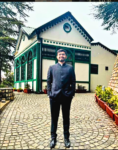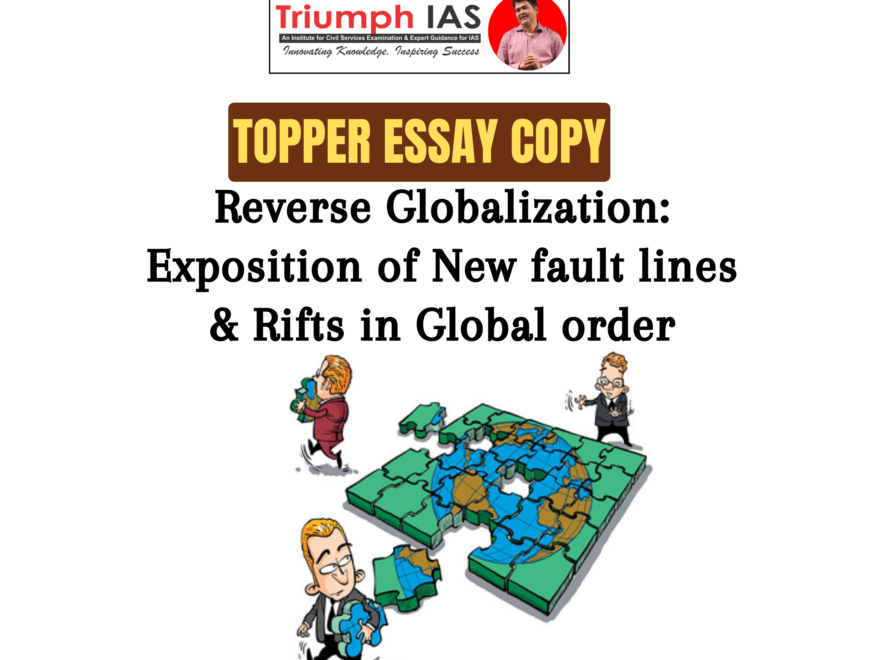IAS,PRAKHAR KUMAR SINGH

Essay topic:
Reverse Globalization: Exposition of New fault lines & Rifts in Global order.
(Relevant for Essay Writing for UPSC Civil Services Examination)
Reverse Globalization: Exposition of New fault lines & Rifts in Global order.With the invention of the steam engine in the 17th century, the world entered a new era with the Industrial Revolution as the engine of growth. With increased production in the next centuries, the world became more globalized. The advent of the internet in the late 1980s further “shrank the distance between places,” and in no time “the internet became the new Times Square.” But in the past decade, the world has entered a reverse cycle of globalization. With increasing protectionism, trade wars, and reverse migration already prevalent across the world, COVID-19 in 2020 has only added fuel to the fire. This essay will hence evaluate various aspects of reverse globalization, its effects on various sections, and the emerging global order that it is shaping. Reverse Globalization: What is it? The best example is that of the US-China trade war currently unfolding. Slapping of trade sanctions on goods, lawsuits on officials, and diplomatic warfare are its manifestations in various forms. But is this only a recent phenomenon? Not exactly. Just after World War II, the world was expected to be a freer and more democratic place. Instead, the lust for territories and establishing hegemony pushed the world into a cold war – a reverse globalization of sorts. Reverse globalization is thus a macro phenomenon having its effect on various socio-economic issues. Emerging Fault Lines The answer lies in the prevailing socio-economic-political conditions. The world today is battling with poverty and unemployment at the same time. In fact, in countries like India, unemployment has been at a 45-year high. With more conservative governments coming into power in countries like the USA and Brazil, closing the borders becomes the natural and easiest option to battle unemployment. Further, with a rising population, pressure on natural resources has been increasing. This has also fueled concerns on the sustainability models of various nations, thus prompting reverse globalization. Many religious groups have been mounting pressure as clashes between more urban global values and traditional customary morality have increased. Cases of Charlie Hebdo in France, Sabrimala temple women entry movement in India, and blasphemy issues in Pakistan are a case in point. Vote bank politics and regionalism have also aggravated grievances against migration due to globalization. This is manifested in the US-India H1B issue where the number of H1B visas to be issued was drastically reduced in 2019. Even intra-country, trains full of migrants from Gujarat to Bihar were common visuals last year. In the economic arena, new fault lines have emerged due to excessive dependence on one nation. China today is the “factory of the world.” But as became apparent amidst the COVID-19 pandemic, excessive dependence on one country does no good to anyone. As global value chains got stressed, many countries were left struggling for basic consumer goods. Let us now turn towards the various manifestations of reverse globalization. As globalization as a force weakens, it becomes more than apparent into crumbling multilateral institution systems including the UN. Countries are increasingly self-asserting themselves even against such institutions. This became clear when China refused to obey the ruling of the International Court of Justice (ICJ) in favor of the Philippines regarding the South China Sea dispute. Amidst the COVID-19 pandemic, rather than showing global support at COVAX facility of WHO, countries are busy in “Vaccine Nationalism.” The USA has already bought millions of doses to be first given to its own citizens rather than the most vulnerable of the lot, reflecting an “America first” policy. Globalization came at its peak when almost all nations across the world came forward to act as a unified form against climate change. The Paris Climate Agreement in 2015 was a result of it. But even the environment, which is a “global common,” has been affected by reverse globalization waves. Rather than the pledged $100 billion a year, less than 2% has materialized. The USA has left the Paris Agreement, and even climate change dismissed as a hoax by US president. The wave of reverse globalization has even affected our households. The incomes have dwindled as people lose jobs. With reverse migration, state infrastructure is already loaded women who had got “a new-found freedom” in households are losing as fast as they got it, as “men return to take charge.” In fact, the effects of this reverse globalization have had an impact on the global world order. Changing World Order Today, China riding high on the waves of globalization is threatening the unquestioned hegemony of the USA. From building military bases in the Indian Ocean to ‘aggressive posturing’ in the South China Sea, it aims to assert itself. This has only hardened the outlook of the USA for reverse globalization reflected in “Make America Great Again.” What is then the way forward to accommodate such changes into our policies? The key lies in strengthening multilateral institutions like the UN. The WTO has not been allowed to function since last year now. The need is to reform it and other such institutions like the UN Security Council to reflect the current global reality. Backchannel diplomacy and track 1.5 dialogues need to be strengthened. It was a hotline between the USA and Moscow which saved the world from a nuclear catastrophe in 1960. Further, China needs to be accommodated in the new order as a global power. India here can act as a ‘negotiator’ and ‘consensus builder’ among the nations on various issues. Further, ideas of economists like Dani Rodrik can help accommodate new realities. The basic cause of reverse globalization being the lack of basic opportunities, poverty, and unemployment to natives. According to his idea, nations are tilted to capitalist-labor removing technology; rather, it is more beneficial in the long run to augment the less-skilled workers. Amidst the chaos, Gandhiji’s saying should be remembered – “We have taken Earth on loan from the future.” Humans should be treated as an end in itself. New fault lines can be filled if each one becomes more accommodative and debate & deliberate with an open outlook. Then only we can forge a world, in the words of Rabindranath Tagore – “Where the world has not been broken into fragments by narrow domestic walls, where words come out from the depth of truth, where the clear stream of reason has not lost its way into the dreary desert sand of dead habit, where the mind is led forward by thee into every widening thought & action, into that heaven of freedom, let my country awake.” |
To master these intricacies and fare well in the Sociology Optional Syllabus, aspiring sociologists might benefit from guidance by the Best Sociology Optional Teacher and participation in the Best Sociology Optional Coaching. These avenues provide comprehensive assistance, ensuring a solid understanding of sociology’s diverse methodologies and techniques
Meta Tags:
Water Resource Management,Water Resource Management,Water Resource Management,Water Resource Management,Water Resource Management,Water Resource Management,Water Resource Management, Water Resource Management,Water Resource Management,Water Resource Management,Water Resource Management

Why Vikash Ranjan’s foundation Classes for Essay?
Proper guidance and assistance are required to learn the skill of writing essay topics in CSE examination. VIKASH RANJAN SIR at TRIUMPH IAS guides students according to the Recent Trends of UPSC, making him the Best Essay Teacher for Essay writing UPSC.
At Triumph IAS, the Best Essay Writing Coaching platform, we not only provide the best study material and applied classes of Essay for IAS but also conduct regular assignments and class tests to assess candidates’ writing skills and understanding of the subject.
Choose The Best Essay Writing Teacher for IAS Preparation and Know our Approach for Essay?
- The Programme is Planned & Executed in a Way that You Write a good Essay for obtaining Effective Score of 140 Plus.
- In this programme we provide Classes on
- How to INTRODUCE The Topic in Context of the THEME of the Essay
- How to Elaborate & Explain the Topic-Theme on Temporal Scale & Sectoral Scale as well as Intellectual Scale in the MAIN BODY of the Essay.
- How to Sum up the Topic in CONCLUSION in Context of the Essay Topic Theme.
- ︎We will Teach You How to use the Knowledge Matrix of General Studies & Optional to write a Good Essay more Logically and Coherently.
- After the Classes You have to “Write to Learn & Learn to Score” .This means You have to Write the Essay Test Papers & Learn from the Feedback & Discussions.
Why Essay is Important and What We Offer in “Essay Test Series”?
- Triumph’s Essay Upgradation Test Series (Under Personal Guidance of Vikash Ranjan Sir) doesn’t only focus on improving student’s linguistic skills but also focus on improving student’s ability to comprehend the topic-sentence (subject) recall & relate the facts, concepts, propose thesis-statements, and logically assimilate the ideas & counter ideas with clarity in expression on temporal & Sectoral Scales of knowledge.
- Further students are provided one-on-one INTERACTION* Session with Vikash Ranjan Sir. Students get personal feedback on their strength and weaknesses, regarding what is ‘good about their essay and what more should be done to make it a better one’ by Vikash Ranjan Sir.
Why to take up this “Essay Test Series and Foundation” Course?
- Essay is Low hanging Fruit. Marks in Essay is Effectively Contributing in Final Selection in New Pattern of Mains Exam. With a Well Developed ‘Knowledge Matrix and Rigorous Practice’, One can Score upto 160 + in Essay. So IAS Aspirants should never Ignore Essay Preparation
- Inculcating Writing Competency in Essay for IAS, which is Different from Essay in English, Essay in School and College.
Follow us :
🔎 https://www.instagram.com/triumphias
🔎https://www.youtube.com/c/TriumphIAS
🔎https://t.me/VikashRanjanSociology
Find More Blogs…
| Compare and contrast Karl Marx’s and Max weber’s | Karl Marx- Historical Materialism |
| Position of Women In the Modern Indian Society | Sociology: Social system and pattern variables |
keyword: Reverse Globalization, Reverse Globalization, Reverse Globalization, Reverse Globalization, Reverse Globalization, Reverse Globalization, Reverse Globalization, Reverse Globalization, Reverse Globalization, Reverse Globalization, Reverse Globalization, Reverse Globalization, Reverse Globalization, Reverse Globalization, Reverse Globalization, Reverse Globalization, Reverse Globalization, Reverse Globalization, Reverse Globalization, Reverse Globalization, Reverse Globalization,

